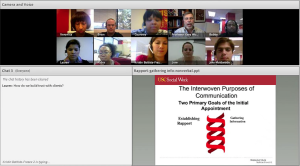School Graduates First Online MSW Class
May 07, 2012 / by Dotty DiemerIn the fall of 2010, the USC School of Social Work opened the “doors” of its new Virtual Academic Center and began offering a web-based master’s degree in social work (Online MSW) for the first time. The school celebrated on May 11 the graduation of its first Online MSW class of 130 students from 26 states, many of whom donned cap and gown to participate in graduation ceremonies alongside the school’s other 478 on-campus graduates.
“The Online MSW program has revolutionized the field of social work education,” said Paul Maiden, vice dean and professor at the USC School of Social Work. “Our virtual platform is unlike any other currently offered by a social work school in the U.S., allowing us to provide students a unique, yet highly personalized, classroom experience and field placement, no matter their location in the U.S. This instructional approach simply was not thought possible 10 years ago.”
Taking advantage of advancements in social networks and face-to-face, “Skype-like” interactive technology, the Online MSW’s Virtual Academic Center is a web-based platform that features live, virtual classes between faculty and students, online presentations, videos, and interactive study groups and chat sessions. As required of all the school’s graduates, the web-based degree program also includes hands-on training through internships in the communities where students live.
“USC's virtual MSW program allowed me to obtain my graduate degree in a non-traditional way, but in a way that suited my needs,” said Alexandra Leichter, an Online MSW graduate from Portland, Oregon. “Along the way I made lasting friendships and was instructed by many incredible faculty members. I will be eternally grateful for the education I received through this program.”
The Online MSW program has enrolled more than 1,200 graduate students since it began. After completion of the core social work curriculum, students pursue concentrations of study depending on interest. Concentrations include Families and Children; Health; Mental Health; and Community Organization, Planning and Administration. A sub-concentration in Military Social Work and Veteran Services – the first of its kind in the country – has also become increasingly popular, as the mental health needs of returning military personnel continue to rise. More than 260 of the current Online MSW students are affiliated with the military in some way.
Among graduates pursuing a career in military social work is Brock McNabb. A veteran combat medic of the Iraq War, McNabb will serve as the social work team leader at the U.S. Veterans Center Program in Honolulu upon graduation.
“Logically, one would think that you couldn’t learn about social work theory, issues and the human condition on a virtual platform, let alone develop and maintain nurturing relationships. The USC Virtual Academic Center proved that logic to be wrong,” said McNabb. “The relationships that I have developed here are just as rich as any we could form in a traditional classroom. There is, perhaps, no better classroom than the VAC to shape willing minds into the social workers of tomorrow."
Career preparation and connections aren’t the only benefits of enrollment in the Online MSW program. Students Jason Anthony of Sacramento, California, and Crystal Guerra of San Diego met in a “virtual” class in 2011 and soon found themselves assigned to the same group project. Love soon blossomed, and the two are now engaged to be married.
Online MSW enrollment numbers have been strong from the start, as the need for social workers in many areas continues to rise. The Bureau of Labor Statistics forecasts 25 percent employment growth for the social work profession, faster than the average for all occupations. The expected job growth is due to an increase in demand for social workers in areas such as health care (34 percent expected growth); mental health and substance abuse (31 percent); and child, family and school (20 percent). The Online MSW program’s web-based access is also beneficial for students living in rural communities, where trained social workers are increasingly in demand.
To reference the work of our faculty online, we ask that you directly quote their work where possible and attribute it to "FACULTY NAME, a professor in the USC Suzanne Dworak-Peck School of Social Work” (LINK: https://dworakpeck.usc.edu)
